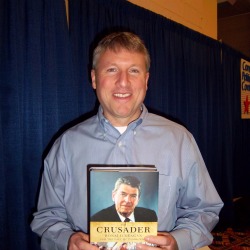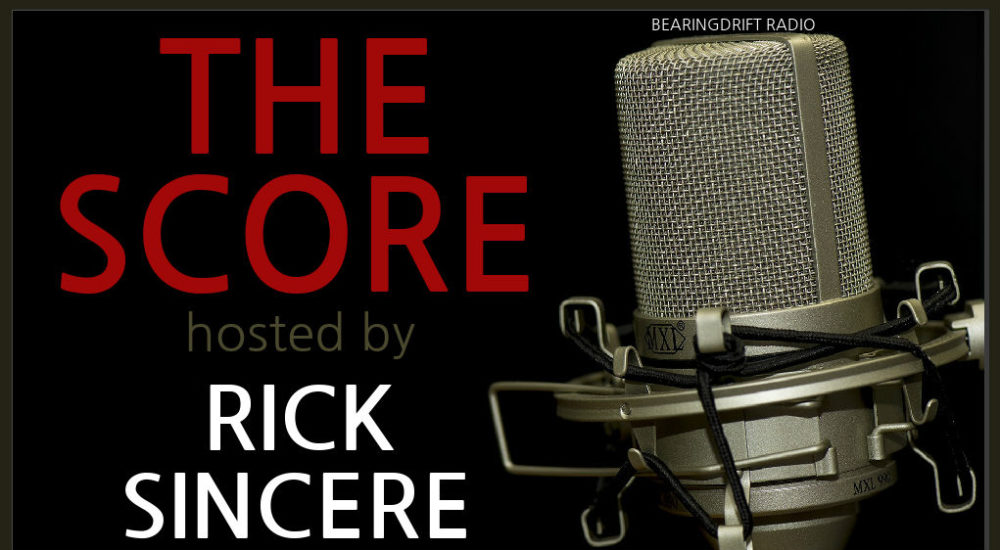The Score: Venezuela Crumbles, Communism’s Fall, Designing Liberty, Taxing Writers
This week on The Score: What’s going on in Venezuela? How did Ronald Reagan win the Cold War against the Soviet Union? Can local governments in Virginia tax free-lance writers? Is there an administrative “design for liberty”?
Return from Hiatus
Last week, The Score took a break and over the previous couple of weeks, we were in reruns, recycling some older interviews with authors about history and biography. This week we are back with new interviews about current affairs – but also a couple of conversations drawn from the archives.
 Coming up first is a repeat guest. Daniel DiMartino is an economics student at Indiana University-Purdue University Indianapolis. He and his family are also refugees from Venezuela, where an oppressive government has driven millions of people out of the country. Affiliated with Young Voices, Daniel joined us on The Score by telephone in February, after an article he wrote for USA Today went viral and landed him on Fox News and other major media outlets.
Coming up first is a repeat guest. Daniel DiMartino is an economics student at Indiana University-Purdue University Indianapolis. He and his family are also refugees from Venezuela, where an oppressive government has driven millions of people out of the country. Affiliated with Young Voices, Daniel joined us on The Score by telephone in February, after an article he wrote for USA Today went viral and landed him on Fox News and other major media outlets.
His most recent article for the Washington Examiner, “To beat socialism, President Trump should grant Venezuelans Temporary Protected Status,” touches on one of the issues he and I talked about. I met him earlier this month in Washington to talk about what has been happening in Venezuela and how the U.S. government has responded.
You can find Daniel on Twitter as @DanielDiMartino.
Cold War Ending
 In the first of our conversations from the archives, I talked to Grove City College historian Paul Kengor about two of his books about the last decades of the Cold War. We met in 2011 at the Conservative Political Action Conference, where I asked him about two of his books: The Crusader: Ronald Reagan and the Fall of Communism and Dupes: How America’s Adversaries Have Manipulated Progressives for a Century.
In the first of our conversations from the archives, I talked to Grove City College historian Paul Kengor about two of his books about the last decades of the Cold War. We met in 2011 at the Conservative Political Action Conference, where I asked him about two of his books: The Crusader: Ronald Reagan and the Fall of Communism and Dupes: How America’s Adversaries Have Manipulated Progressives for a Century.
With regard to that first book, Kengor told me:
The title of the book, The Crusader, emerged from research Kengor did in the Soviet archives.
As Kengor was reading the Soviet documents, he explained, such as Pravda, Izvestia, and transcripts of a TV program called Studio 9 (“the Moscow version of 60 Minutes”), and memoirs of Soviet officials like Ambassador Anatoly Dobrynin and foreign minister Andrei Gromyko, he discovered “they called Reagan ‘the crusader.’”
The Soviets, he said, “understood better than American liberal academics that Reagan, beginning in the 1950s, had signed up for groups like General Lucius Clay’s Crusade for Freedom [and] Dr. Fred Schwarz’s Christian Anti-Communist Crusade.”
Reagan himself, Kengor noted, “had been using that word. He didn’t mean it in a religious sense, although Reagan was religiously inspired to undermine this viciously atheistic empire. (As Gorbachev said, the Soviets pursued a war on religion.) But Reagan meant the word crusade in the sense of crusade for freedom, a crusade to undermine” the USSR.
Paul Kengor is on Twitter as @DrPaulKengor.
Design for Liberty
 Richard Epstein is a prominent libertarian law professor whose books on the Constitution and how law intersects with economics have been best sellers. These include Takings: Private Property and the Power of Eminent Domain (1985), Principles For A Free Society: Reconciling Individual Liberty With The Common Good (2002), and The Classical Liberal Constitution: The Uncertain Quest for Limited Government (2017).
Richard Epstein is a prominent libertarian law professor whose books on the Constitution and how law intersects with economics have been best sellers. These include Takings: Private Property and the Power of Eminent Domain (1985), Principles For A Free Society: Reconciling Individual Liberty With The Common Good (2002), and The Classical Liberal Constitution: The Uncertain Quest for Limited Government (2017).
In December 2011, I spoke to Professor Epstein about his book, Design for Liberty: Private Property, Public Administration, and the Rule of Law. I also asked him about the development of eminent domain policies in the wake of the Supreme Court’s infamous Kelo decision of 2005.
“No one is satisfied,” he said, with how the reactions to Kelo have played out over the past six years.
“This is the basic breakdown,” Epstein explained. “There are a few states which have fairly severe changes, some of them judicially, some otherwise. Michigan and Ohio, for example, are two.”
In addition, “many states have cosmetic changes, which require administrators to think more deeply before they do terrible things,” he pointed out, “and some states have relatively nominal requirements.”
Among these various regimes, he explained further, “the real difference turns out not to be in the law, it turns out to be in the practice.”
The reason is, he said, is that “once the Kelo situation came down, it raised the political cost to anybody who now wants to engage in taking of private property, particularly if it turns out to be a residential home.”
Richard A. Epstein is Tisch Professor of Law at New York University and is on Twitter as @RichardAEpstein.
Novel Tax Policy
 Earlier this summer, the Institute for Justice – which has been described by George Will as “a merry band of libertarian litigators in Washington who fight for economic rights wherever they are menaced” – announced it was suing Albemarle County and the City of Charlottesville in a case that has implications for taxation and the exercise of First Amendment rights to free speech and freedom of the press.
Earlier this summer, the Institute for Justice – which has been described by George Will as “a merry band of libertarian litigators in Washington who fight for economic rights wherever they are menaced” – announced it was suing Albemarle County and the City of Charlottesville in a case that has implications for taxation and the exercise of First Amendment rights to free speech and freedom of the press.
While visiting IJ’s headquarters in early August, I spoke to the lead attorney in the case, Renée Flaherty and asked her to lay out the basic facts.
Flaherty is on Twitter as @reneedflaherty.
After I left the Institute for Justice’s main office in Arlington, I met with Corban Addison, one of the two novelists who are suing Charlottesville and Albemarle County. He explained how he became involved in the case and how he and John Hart found the Institute for Justice to champion their cause.
 As he notes toward the end of our conversation, Addison is the author of several well-received novels, including A Walk Across the Sun (2012), The Garden of Burning Sand (2014), The Tears of Dark Water (2015), and A Harvest of Thorns (2017).
As he notes toward the end of our conversation, Addison is the author of several well-received novels, including A Walk Across the Sun (2012), The Garden of Burning Sand (2014), The Tears of Dark Water (2015), and A Harvest of Thorns (2017).
You can find Corban Addison on Twitter at @CorbanAddison.
As it happens, a few years ago I interviewed Charlottesville Commissioner of the Revenue Todd Divers, shortly before he was elected to that position.
 It’s Divers’ office that sent a big tax bill to Corban Addison, so it is interesting how, in this brief conversation, he says that the Commissioner of the Revenue’s job is to treat businesses fairly and not act arbitrarily.
It’s Divers’ office that sent a big tax bill to Corban Addison, so it is interesting how, in this brief conversation, he says that the Commissioner of the Revenue’s job is to treat businesses fairly and not act arbitrarily.
Divers and I met up at the Charlottesville Pride Festival in September 2013.
Come back next week for more news, reviews, and interviews from The Score. As the political campaign season gets into gear beginning on Labor Day, expect fresh conversations with candidates and elected officials from around Virginia.


